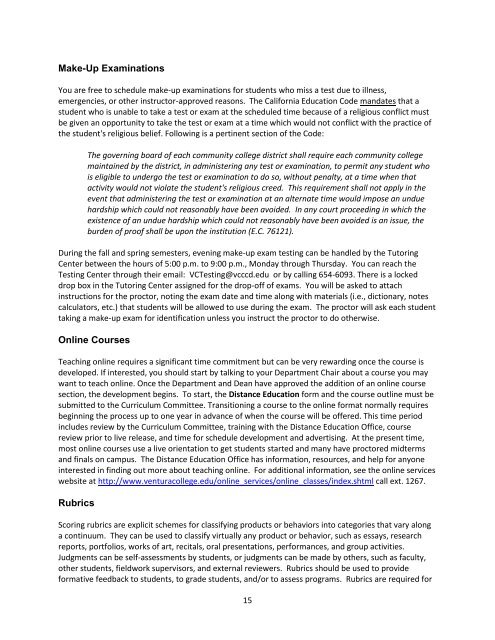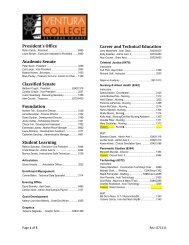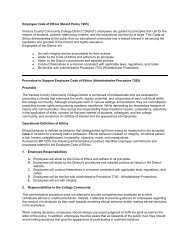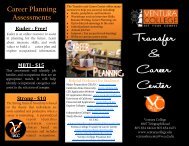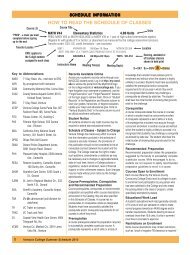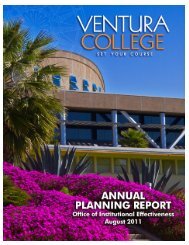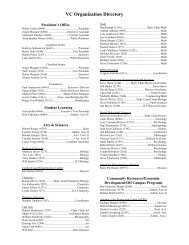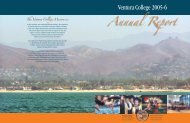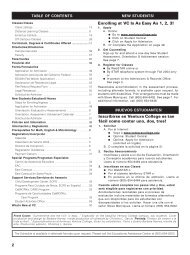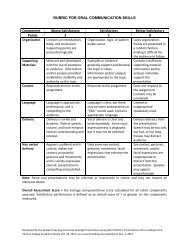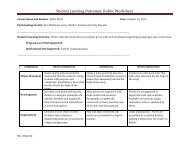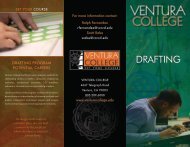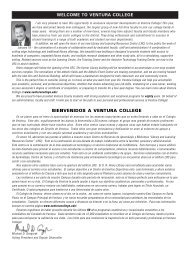Part-Time Faculty Handbook - Ventura College
Part-Time Faculty Handbook - Ventura College
Part-Time Faculty Handbook - Ventura College
Create successful ePaper yourself
Turn your PDF publications into a flip-book with our unique Google optimized e-Paper software.
Make-Up Examinations<br />
You are free to schedule make-up examinations for students who miss a test due to illness,<br />
emergencies, or other instructor-approved reasons. The California Education Code mandates that a<br />
student who is unable to take a test or exam at the scheduled time because of a religious conflict must<br />
be given an opportunity to take the test or exam at a time which would not conflict with the practice of<br />
the student's religious belief. Following is a pertinent section of the Code:<br />
The governing board of each community college district shall require each community college<br />
maintained by the district, in administering any test or examination, to permit any student who<br />
is eligible to undergo the test or examination to do so, without penalty, at a time when that<br />
activity would not violate the student's religious creed. This requirement shall not apply in the<br />
event that administering the test or examination at an alternate time would impose an undue<br />
hardship which could not reasonably have been avoided. In any court proceeding in which the<br />
existence of an undue hardship which could not reasonably have been avoided is an issue, the<br />
burden of proof shall be upon the institution (E.C. 76121).<br />
During the fall and spring semesters, evening make-up exam testing can be handled by the Tutoring<br />
Center between the hours of 5:00 p.m. to 9:00 p.m., Monday through Thursday. You can reach the<br />
Testing Center through their email: VCTesting@vcccd.edu or by calling 654-6093. There is a locked<br />
drop box in the Tutoring Center assigned for the drop-off of exams. You will be asked to attach<br />
instructions for the proctor, noting the exam date and time along with materials (i.e., dictionary, notes<br />
calculators, etc.) that students will be allowed to use during the exam. The proctor will ask each student<br />
taking a make-up exam for identification unless you instruct the proctor to do otherwise.<br />
Online Courses<br />
Teaching online requires a significant time commitment but can be very rewarding once the course is<br />
developed. If interested, you should start by talking to your Department Chair about a course you may<br />
want to teach online. Once the Department and Dean have approved the addition of an online course<br />
section, the development begins. To start, the Distance Education form and the course outline must be<br />
submitted to the Curriculum Committee. Transitioning a course to the online format normally requires<br />
beginning the process up to one year in advance of when the course will be offered. This time period<br />
includes review by the Curriculum Committee, training with the Distance Education Office, course<br />
review prior to live release, and time for schedule development and advertising. At the present time,<br />
most online courses use a live orientation to get students started and many have proctored midterms<br />
and finals on campus. The Distance Education Office has information, resources, and help for anyone<br />
interested in finding out more about teaching online. For additional information, see the online services<br />
website at http://www.venturacollege.edu/online_services/online_classes/index.shtml call ext. 1267.<br />
Rubrics<br />
Scoring rubrics are explicit schemes for classifying products or behaviors into categories that vary along<br />
a continuum. They can be used to classify virtually any product or behavior, such as essays, research<br />
reports, portfolios, works of art, recitals, oral presentations, performances, and group activities.<br />
Judgments can be self-assessments by students, or judgments can be made by others, such as faculty,<br />
other students, fieldwork supervisors, and external reviewers. Rubrics should be used to provide<br />
formative feedback to students, to grade students, and/or to assess programs. Rubrics are required for<br />
15


